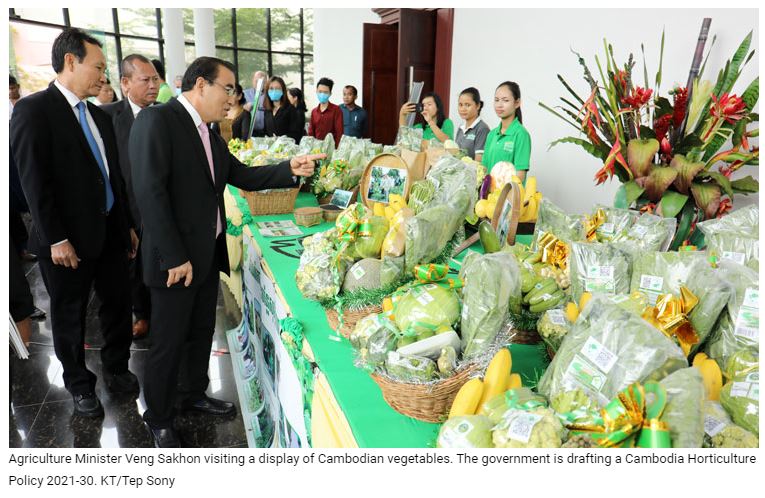Cambodia: New horticulture policy ‘a positive step’
The government is drafting a Cambodia horticulture policy for 2021-30 aimed at making it more competitive.
Its objectives are broad in nature and comprehensively ambitious. Among the policy’s goals are moves to modernise production towards attaining year-round growing seasons and improvements in product quality, safety and price in order to achieve competitive parity or advantages in local, regional and global marketplaces. Additional policy areas of concentration include the acceleration of research and development towards enhancing plant climate resilience and actions to ensure the meeting of local and export demand. Initiatives that encourage private sector development partners, producers and agricultural cooperatives to invest in horticulture value chains and related services are paramount in the policy initiatives, as are the strengthening of both human resources and the institutional and legal framework that will help develop the horticulture sector.
The draft policy is being prepared by the Working Group of the General Directorate of Agriculture, Ministry of Agriculture, Forestry and Fisheries, with the assistance of the USAID-Cambodia Harvest II, a five-year project funded by USAID, that aims to accelerate the growth of Cambodia’s commercial horticulture in the provinces of Pursat, Battambang, Siem Reap and Kampong Thom.
While the policy is intended to substantially raise horticulture production levels and improve product affordability and safety, it also aims to ensure that small-scale farmers be given tools to better coordinate and link with markets, helping most of them to grow and realise the economies of scale needed for greater efficiency.
It will take an expanded value-chain approach, focused on fixing the major gaps that exist along the existing value chains. The more holistic method intends to address challenges in reducing the production costs faced by small- and medium-sized farmers.
The overall purpose of the policy is to increase horticulture sector development in order to compete with and in international markets. Specifically, it aims to address current constraints and reap opportunities across the value chains by enacting policy measures based on conducting thorough reviews and extensive consultation regarding the practical experiences of related projects and synergies between various related groups.
Kean Sophea, director of the department of horticulture and subsidiary crops at the Ministry of Agriculture, Forestry and Fisheries, said: “Previously, there was no national policy for the horticulture sector, so there is no concrete road map, which has made the implementation of policy in this sector challenging.” He added that it is also difficult to attract the investors needed for sector growth as Cambodia does not have policy support in place. Sophea also noted that the need for incentives to encourage investment in irrigation systems and infrastructure are also included in the policy as a means of hastening growth.
“This policy will support, offer guidance and identify a roadmap that adds clarity to the path ahead for the Kingdom’s horticulture sector. It is in the draft stage and, once completed, will be submitted to the Minister of Agriculture and other relevant ministries for additional input,” Sophea said.
Hun Lak, chief executive officer of TROPICAM Fruits and Vegetables, welcomed the move. He said that it will be beneficial to have a policy on horticulture in place to counter the many issues growers, markets and investors face.
“Development partners, the private sector and government all came together to discuss the sector’s challenges in preparation for the development of this policy,” he said.
Lak added the policy is crucial with the horticulture sector facing tough challenges based on it not being competitive with product imports from neighbouring countries. Lack of knowledge among producers about the standards required by both local and regional markets is a key factor in this deficit in competitiveness.
Last year, Cambodia had 57,262 hectares of vegetable plantations across the country and produced approximately 682,012 tonnes of food. However, the demand for vegetables is about 1 million tonnes yearly, somewhere between 2,500 tonnes to 3,000 tonnes daily according to a report from the General Directorate of Agriculture (GDA) at the Ministry of Agriculture.
Because Cambodia is not self-sufficient in vegetable production, it imports an average of 500 tonnes to 1,000 tonnes per day in order to meet local demand. Imported vegetables are undocumented with no clear source of origin identified and no proper checks on their fitness for human consumption, presenting a potential public health hazard, said the GDA.
Source: https://www.khmertimeskh.com/50781199/new-horticulture-policy-a-positive-step/


 English
English




